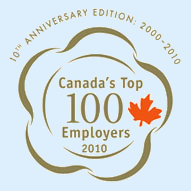Summer flex time gains traction
 According to a survey published in early May by Aon Consulting, 48% of Canadian companies are offering flexible working hours in the summer. Among the 477 companies responding, 30% said that they also offered flex time throughout the year. The study found a wide variety of flexible work arrangements, including working a half hour extra every day to leave early on Fridays, and working extra hours during the month to be off Friday before a long weekend, for instance. Some companies also close early on Fridays or allow employees to leave early without having to work extra hours.
According to a survey published in early May by Aon Consulting, 48% of Canadian companies are offering flexible working hours in the summer. Among the 477 companies responding, 30% said that they also offered flex time throughout the year. The study found a wide variety of flexible work arrangements, including working a half hour extra every day to leave early on Fridays, and working extra hours during the month to be off Friday before a long weekend, for instance. Some companies also close early on Fridays or allow employees to leave early without having to work extra hours.
Women make gains in unexpected fields
 According to a study released by Statistics Canada in late April, between 1996 and 2006, women went from being a minority to a majority in a number of non-traditional occupations (i.e. where female representation at the beginning of the period was low). They now outnumber men in a number of fields including as managers in art, culture, recreation and sport, in insurance, real estate and purchasing, and as machine operators in textiles. They also hold close to 35% of positions as sales, marketing and advertising managers, and 22% of jobs as engineering, architecture and information systems department managers.
According to a study released by Statistics Canada in late April, between 1996 and 2006, women went from being a minority to a majority in a number of non-traditional occupations (i.e. where female representation at the beginning of the period was low). They now outnumber men in a number of fields including as managers in art, culture, recreation and sport, in insurance, real estate and purchasing, and as machine operators in textiles. They also hold close to 35% of positions as sales, marketing and advertising managers, and 22% of jobs as engineering, architecture and information systems department managers.
Hewitt Associates acquires HRAdvance Inc.
 , specializing in human resources and outsourcing, announced the acquisition of benefits dependent audit firm HRAdvance Inc. on May 6. HRAdvance’s solution further strengthens Hewitt’s dependent eligibility offer. Hewitt’s research in the U.S. shows that the amount employers pay in health care expenses has almost doubled in 10 years, from $3,531 per beneficiary in 2001 to a little over $7,000 in 2010. According to the two companies, conducting eligibility audits and removing ineligible dependents results in savings of 4 to 8% of annual health care costs.
, specializing in human resources and outsourcing, announced the acquisition of benefits dependent audit firm HRAdvance Inc. on May 6. HRAdvance’s solution further strengthens Hewitt’s dependent eligibility offer. Hewitt’s research in the U.S. shows that the amount employers pay in health care expenses has almost doubled in 10 years, from $3,531 per beneficiary in 2001 to a little over $7,000 in 2010. According to the two companies, conducting eligibility audits and removing ineligible dependents results in savings of 4 to 8% of annual health care costs.
31% of companies to switch hands within five years
 According to an CICA/RBC poll of 249 chartered accountants, 31% of companies will change hands within five years. Eighteen per cent of companies that are anticipating a switch in ownership have not yet discussed succession, and 42% are only at the very beginning of the process. Only 14% of respondents had a complete succession plan in place.
According to an CICA/RBC poll of 249 chartered accountants, 31% of companies will change hands within five years. Eighteen per cent of companies that are anticipating a switch in ownership have not yet discussed succession, and 42% are only at the very beginning of the process. Only 14% of respondents had a complete succession plan in place.
Standout Jobs changes hands
![]() Ben Yoskovitz, co-founder of , announced the sale of the Montreal company in his blog on May 3. Founded in 2007 by Mr. Yoskovitz and two partners, Fred Ngo and Austin Hill, the company specializes in the use of new technologies for recruiting. Its services include training on using Web 2.0 and social networks for recruiters and solutions for increasing one’s online presence, optimizing a career section or dedicated site, improving one’s employer image to attract employees, etc. Ben Yoskovitz specifies in his post that the acquirer cannot be named for now. Stay tuned!
Ben Yoskovitz, co-founder of , announced the sale of the Montreal company in his blog on May 3. Founded in 2007 by Mr. Yoskovitz and two partners, Fred Ngo and Austin Hill, the company specializes in the use of new technologies for recruiting. Its services include training on using Web 2.0 and social networks for recruiters and solutions for increasing one’s online presence, optimizing a career section or dedicated site, improving one’s employer image to attract employees, etc. Ben Yoskovitz specifies in his post that the acquirer cannot be named for now. Stay tuned!
Resignation.ca
 jobWings careers has just launched the www.resignation.ca website (www.demission.ca in French). The site is chock-full of information about quitting your job and explores the ins and outs of how to go about it.
jobWings careers has just launched the www.resignation.ca website (www.demission.ca in French). The site is chock-full of information about quitting your job and explores the ins and outs of how to go about it.
If you’re unhappy at work or are prey to doubts and don’t know whom to discuss them with, don’t worry, the site will address all your concerns. From your very first questions to actually following through, the hands-on content examines the thoughts underlying the decision to quit, and then traces a portrait of the entire process.
In true how-to style, the site provides tools and information for each step along the way. Tests, options to be considered and specialists’ advice focus on what you need to ask yourself before, during and after quitting your job.
75% of Canadians confident in their professional training
 Three quarters of Canadians believe they have the skills needed to find a new job as interesting as their current position, according to an Ipsos Reid poll for Human Resources and Skills Development Canada. Workers had the most confidence in their skills in British Columbia, with 84% of those polled saying they were satisfied with their qualifications. Quebec didn’t fare too badly either, at 82%. The poll also revealed that 57% of Canadians would not return to school to update their skills, through lack of interest (36%) or for financial reasons (21%). Conversely, if they were job hunting, 74% would take a job-related course and 48% would start their own business.
Three quarters of Canadians believe they have the skills needed to find a new job as interesting as their current position, according to an Ipsos Reid poll for Human Resources and Skills Development Canada. Workers had the most confidence in their skills in British Columbia, with 84% of those polled saying they were satisfied with their qualifications. Quebec didn’t fare too badly either, at 82%. The poll also revealed that 57% of Canadians would not return to school to update their skills, through lack of interest (36%) or for financial reasons (21%). Conversely, if they were job hunting, 74% would take a job-related course and 48% would start their own business.
The top 50 greenest employers in Canada
 On April 22, 50 Canadian firms were recognized for their environmental protection efforts. For the third year in a row, this special reward, created by the organizers of Canada's Top 100 Employers project, underscores companies’ implementation of environmental protection policies. According to Richard Yerema, Managing Editor of Mediacorp Canada Inc., an increasing number of companies are incorporating “green” values into their culture. Consult the winners’ different initiatives online for some great ideas.
On April 22, 50 Canadian firms were recognized for their environmental protection efforts. For the third year in a row, this special reward, created by the organizers of Canada's Top 100 Employers project, underscores companies’ implementation of environmental protection policies. According to Richard Yerema, Managing Editor of Mediacorp Canada Inc., an increasing number of companies are incorporating “green” values into their culture. Consult the winners’ different initiatives online for some great ideas.
View the list of winners in alphabetical order
Decrease in temporary employees at the federal government
 According to the Association of Canadian Search, Employment and Staffing Services, the federal government has significantly reduced its use of temporary employees over the past few years. Last year, their numbers were down 30%, and agencies fear the situation is not improving. Association President Steve Jones believes that these things are cyclical and that placement agencies continue to be the best way of finding a job in the national capital region, especially for the federal government.
According to the Association of Canadian Search, Employment and Staffing Services, the federal government has significantly reduced its use of temporary employees over the past few years. Last year, their numbers were down 30%, and agencies fear the situation is not improving. Association President Steve Jones believes that these things are cyclical and that placement agencies continue to be the best way of finding a job in the national capital region, especially for the federal government.
IBM could see its permanent workforce shrink by three quarters thanks to crowd sourcing
 During an April 23 interview with Personnel Today, Tim Ringo, head of IBM Human Capital Management, discussed a scenario that would allow the company to chop its workforce from 399,000 permanent employees to 100,000 by 2017. How? Through “crowd sourcing,” which refers to outsourcing jobs to subcontractors on a contract basis as per the company’s needs. According to Mr. Ringo, this model would allow IBM to reduce its personnel costs and related charges (e.g. buildings, pensions, health care). IBM denied wanting to implement such a human resources strategy.
During an April 23 interview with Personnel Today, Tim Ringo, head of IBM Human Capital Management, discussed a scenario that would allow the company to chop its workforce from 399,000 permanent employees to 100,000 by 2017. How? Through “crowd sourcing,” which refers to outsourcing jobs to subcontractors on a contract basis as per the company’s needs. According to Mr. Ringo, this model would allow IBM to reduce its personnel costs and related charges (e.g. buildings, pensions, health care). IBM denied wanting to implement such a human resources strategy.